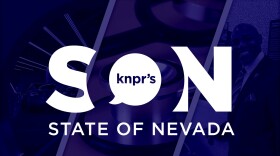All eyes will be on Nevada next Saturday when Democrat voters will choose who they want to challenge President Donald Trump.
But the 2020 caucus hasn’t even begun and there have already been some complications.
Thanks to Iowa’s botched caucus almost two weeks ago, the Nevada Democratic Party has had to reverse course on using apps that would have recorded and counted all the votes. It will now use paper ballots, a move that has had the party scrambling to reorganize in a short period of time.
Besides the paper ballots, organizers will be using internet-connected iPads. Election experts have warned that rolling out new technology without a lot of testing and training could lead to problems.
However, Nevada Democratic Party Chairman William McCurdy told KNPR's State of Nevada that he is confident that the technology will be secure and the volunteers have been properly trained.
"What folks can look forward to is knowing that the Nevada State Democratic Party has done the work, day in and day out, to make sure that we are trained and we are ready to go," he said.
The party said there would be a two-step verification process for reporting that includes the use of results submitted by phone and electronically.
McCurdy said the Nevada Caucus will be historic for several reasons.
"There has never been a caucus state to offer early voting and especially offer early voting in multiple languages. We have English, Spanish, Tagalog, which will reflect the diversity and the [diversity] of our state. That is why Nevada's voice will matter so much because ... we will show the rest of the states that are next, especially on Super Tuesday, what the first diverse caucus state has to say."
While McCurdy is confident, a lot of people are questioning whether the caucus system is the best way to go.
In a caucus, people must go to the precinct they are assigned, which in rural areas could be miles away.
The process can take hours as people debate which candidate should get their vote and then move to another candidate if their original pick doesn't get enough votes.
Megan Messerly is a reporter with the Nevada Independent. She covered the Iowa caucuses and the New Hampshire primary.
She said party diehards like the caucus process as a way to build up the party. Messerly pointed out that, historically, a caucus made sense because a community would come together and choose who they want to be president, and the delegates would then go to the county convention, then to the state convention and finally to the national party convention.
"The goal was to have members of the party choose their nominee," she said, "It kind of made sense in this informal sense. People come together in a room and debate their choices."
Messerly said there are very few states that still use a caucus. She said the traditional primary format is more comfortable for most people, and in Nevada, there is not a long tradition of caucusing like there is in Iowa.
"Thinking about Nevada, we have had a caucus for some time, but a lot of folks haven't caucused before," she said, "They are still getting comfortable with the system. There is a lot of turnover, cycle over cycle, of folks who are just learning to caucus for the first time."
Messerly said you can show up to any early voting site in your county, but you can only vote either at early voting or on caucus day -- not both.
Only registered Democrats can vote in the caucus. People who are registered Republican or Independent cannot vote. If you are not registered as a Democrat and want to register, there is onsite registration at caucus sites.
The Nevada Republican Party is not holding a caucus or primary this year.
RESOURCES:
Nevada Democratic Party - Caucus information
Frequently Asked Questions
William McCurdy, chair, Nevada Democratic party, and Nevada assemblyman; Megan Messerly, reporter, Nevada Independent










